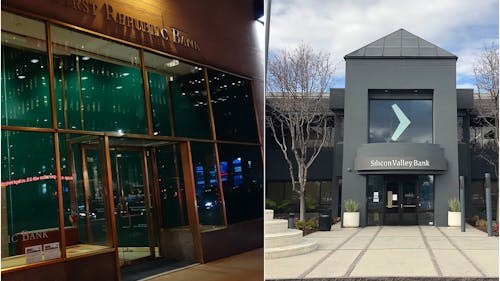What could current banking crisis mean for future economy, Rutgers students?

Yesterday, San Francisco-based First Republic Bank collapsed and was acquired by JPMorgan Chase — this incident comes as the financial sector and federal regulators navigate the ongoing banking crisis.
Earlier this year, the banking industry entered a historic period of turmoil after the failure of Silicon Valley Bank (SVB), the then-16th-largest U.S. bank. A Rutgers professor and several students gave their perspectives on these issues in the banking industry.
John Longo, a Rutgers Business School professor, said SVB's collapse occurred after investors questioned the bank's financial stability and the resulting panic caused a bank run.
A bank run refers to when numerous customers simultaneously withdraw their money from a certain bank due to worries about the bank's funds — such withdrawals may actually cause the bank to collapse.
The initial collapse of SVB, a bank that specialized in lending to start-up companies, heightened concerns about the reliability of regional banks and led to a bank run on the now-defunct Signature Bank, he said.
"Every bank is highly levered. So what that means is that, as an example, if you put $100 in the bank, the bank puts the equivalent of less than $10 in either the physical or electronic vault," he said. "So if everybody rushed to the vault at the same time, the bank couldn't service everybody."
Longo said that the Federal Deposit Insurance Corporation (FDIC) insures up to $250,000 per account for banks within its system, meaning that if an insured bank were to collapse, its customers would expect some of their money to be protected.
SVB and Signature Bank were both FDIC-insured but the federal government added additional protection to all uninsured deposits at the banks to avoid greater economic turmoil, he said.
Longo said he attributes the insolvency of SVB to inadequate risk management and uncommon investment strategies compared to other banks.
Regarding how other banks are handling the financial crisis, he said the biggest U.S. banks, such as JPMorgan Chase and Bank of America, experienced a rise in their deposits as customers sought financial safety. Though this trend may contribute to the "too big to fail" issue with these larger banks, he said.
"I don't think this crisis is as serious as (the 2008 to 2009 financial crisis) because a lot of the biggest banks were on the ropes then," Longo said. "But I do think that banks, regional banks especially, will curtail their lending, and that could push what was a slow economy into what I would think would be a mild recession."
With respect to how this all affects students, he said the current banking crisis could hurt students receiving loans due to stricter lending policies from banks and persistent inflation escalating interest rates.
He said he hopes Rutgers students use the banking turmoil as an opportunity to learn about financial diversification and increase their awareness of the anticipated economic effects.
Jessica Gupta, a Rutgers Business School first-year, said the development of the banking crisis surprised her, and she knows several people who were worried about the security of their own money at banks.
Regarding the economy, she said she is anxious about the uncertainty of a potential recession and its ramifications on her finances.
"The people around me who are working — like my parents, my friend's parents or my friends who have just entered the job market — they're all saying the same thing that their wages and salaries have not kept in line with inflation, and everything's becoming unaffordable for them," she said.
Gupta said she is also concerned with the crisis' effect on internship recruitment for banking roles and feels her planned career path in finance could be tougher to break into.
To that end, Michael Shalonov, a Rutgers Business School junior, said he is concerned about the banking crisis' outcome on job security in the sector, particularly with recent layoffs. Ultimately, though, he said he believes this current crisis will be less severe than in 2008.
Shalonov said the banking crisis and events related to the turmoil have become widely discussed at the Rutgers Business School within his finance classes and among his peers.
He said he thinks Rutgers students, irrespective of major, should observe and understand how the banking crisis unfolds, including its impact on their friends, family and others.
"Regardless of what you're majoring in, this is a very important news event that should not be ignored because the banking crisis — it doesn't just affect jobs on Wall Street, it affects everybody," Shalonov said.



